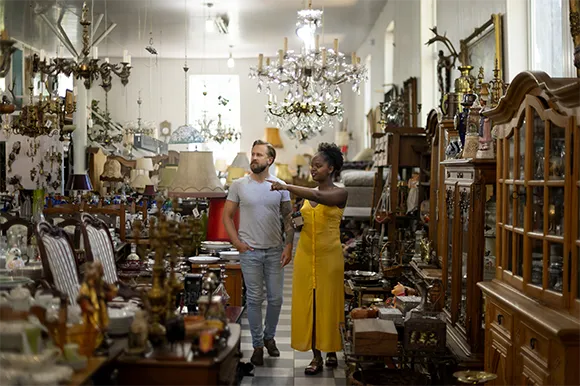Build a Sustainable Business With Antique Store Insurance
Antique stores are repositories of precious artifacts, many with a premium price tag. The value of these items tends to escalate with their age or demand, creating an upward trajectory in pricing. So, antique businesses hold the promise of significant profitability. However, it is also fraught with financial risks.
Antique stores must guard against specific events that could become a business liability. One key concern is the susceptibility to financial losses when antiques are stolen or damaged, considering their high value in the market.
The remedy lies in Antique Store Insurance. Let's delve into the pitfalls that antique stores may encounter and how to select the right type of insurance for your business.
Risks of Running an Antique Store
Antique stores or gift shops tend to be on busy streets or inside spaces like malls with high traffic. Here are some possible loss scenarios that your business may face:
- Antique shops are vulnerable to incidents of burglary. Possible scenarios include a meticulously orchestrated heist targeting a specific artifact. The financial consequences for the business may be challenging to bear.
- A client carries a laptop to the store. During a negotiation, an employee stumbles, knocking the laptop off the counter and breaking the laptop. The customer wants compensation for the damaged laptop.
- While moving some antique furniture, an employee falls, breaking their wrist. The injury necessitates hospitalization and physiotherapy during the recovery process.
- While transporting antiques to an exhibition, the vehicle's electrical system shorts out, and a fire ensues, destroying some antiques.

Business insurance for antique stores protects your business from unexpected situations mentioned above and similar risks.
Types of Business Insurance for Antique Stores
Here's a snapshot of the categories of Business Insurance For Antique Stores that you need to keep in mind when selecting your policy:
General Liability Insurance
Like any other business enterprise, your antique store needs general liability insurance, which can cover a wide range of third-party lawsuits. This type of insurance can help you bear liabilities related to the business's negligence for bodily injuries, damaged property, and advertising injury against a third party. It can help pay for lawyers, court fees, and settlement costs.
Commercial Property Insurance
This is an essential type of insurance for antique stores. Commercial property insurance can cover damage to buildings and loss or damage to the contents.
Claims need to be related to specific perils, such as vandalism, fire, wind damage, and theft, to name a few of the covered perils on a property policy. However, damage from natural calamities such as earthquakes and floods is not usually included in a property policy. Specific coverage for these perils may need to be purchased separately.
While commercial property insurance is suitable for property losses on buildings and contents, it may not be the best way to insure antique inventory.
Due to difficulties with replacement or actual cash valuations for antiques and specialty items, you may need an inland marine policy with specific scheduled values for each item insured to avoid claim settlement disputes with the insurer. Additionally, inland marine insurance can cover damage to antiques during transportation or on exhibit.
Commercial Auto Insurance
Antique stores may have business-owned vehicles to transport antiques to the store or deliver antiques to clients. If the company's driver is at fault for an accident, commercial auto insurance pays for third-party property damage and bodily injury claims or lawsuits. Physical damage insurance can be purchased for the business's vehicles for damage or loss resulting from collision, fire, theft, vandalism, and flood.
Workers' Compensation Insurance
Antique stores should consider workers' compensation insurance for all staff, from sales clerks to marketing personnel and drivers. This type of insurance is usually mandatory once a business reaches three employees, depending on the state.
It covers costs associated with employees who sustain injuries on the job. Workers' compensation insurance pays the medical bills and other ongoing care and rehabilitation expenses. A percentage of lost wages is paid to the employee during recovery if they cannot perform their regular duties. Benefits paid are statutory, and even if you have one employee and may not be required by law to buy a policy, getting this coverage with even one employee is advisable.
Costs of Antique Store Business Insurance
The cost of your Antique Store Business Insurance policy is dependent on various factors that include:
- How many stores are owned by you - is it a standalone store or a chain? Costs go up with several locations, more revenue, and employees.
- What type of neighborhood is the store located in? A location with a higher crime rate may have higher premiums.
- Do you have company-owned vehicles that need a business auto policy?
- The number of staff employed and annual payroll by position affect workers' compensation premiums. A driver's job may be riskier than a receptionist's.
- What are the values of owned assets, buildings, contents, and antiques? Higher values insured equates to higher premiums.
Key Takeaways
Investing in antique insurance can shield your business against third-party liabilities, asset loss or damage, and the aforementioned common scenarios. Carefully choosing the elements of your insurance program and securing coverage that aligns with your business requirements is of utmost significance.
Collaborating with a credible insurance agency, such as Insurance Advisor, is crucial. This empowers you to conduct a pragmatic assessment of your business insurance needs and access the protection your enterprise deserves. Explore the Insurance Advisor blog or visit our website for further information and insight.


